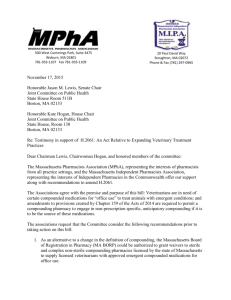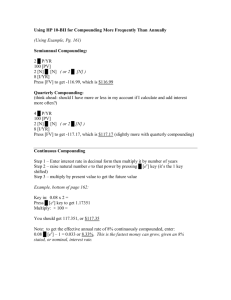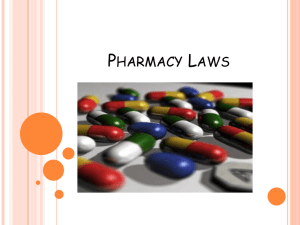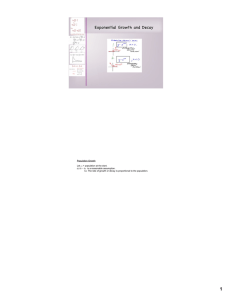Congress Passes New Drug Compounding Law Increasing Federal Oversight Over Compounding Pharmacies
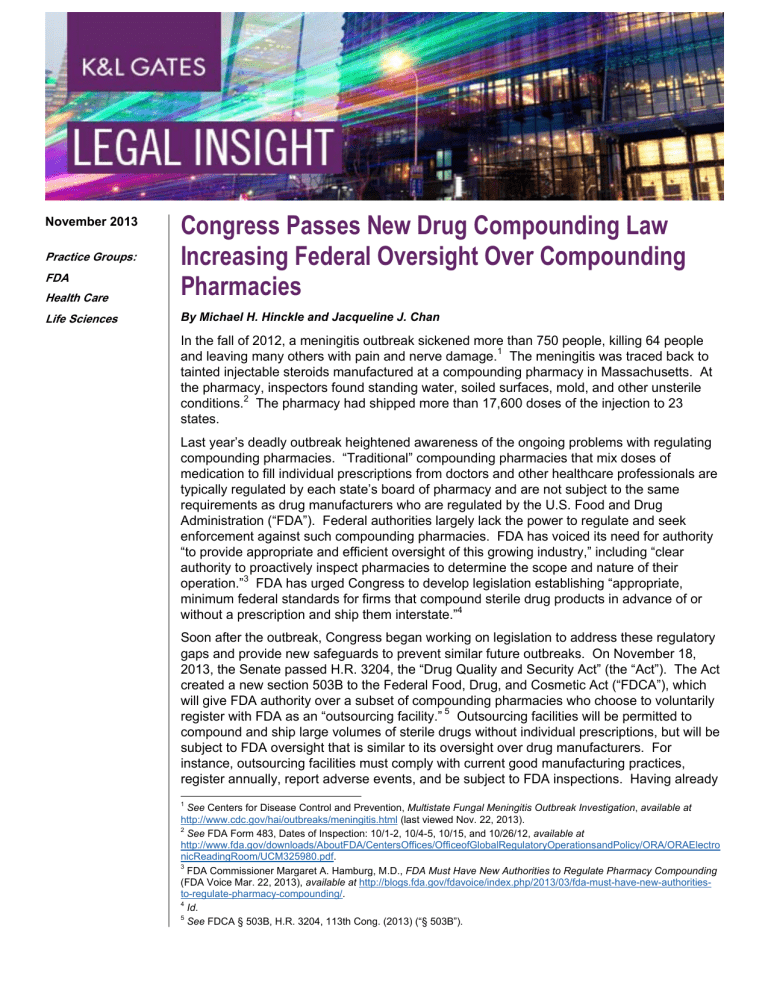
November 2013
Practice Groups:
FDA
Health Care
Life Sciences
Congress Passes New Drug Compounding Law
Increasing Federal Oversight Over Compounding
Pharmacies
By Michael H. Hinckle and Jacqueline J. Chan
In the fall of 2012, a meningitis outbreak sickened more than 750 people, killing 64 people and leaving many others with pain and nerve damage.
1
The meningitis was traced back to tainted injectable steroids manufactured at a compounding pharmacy in Massachusetts. At the pharmacy, inspectors found standing water, soiled surfaces, mold, and other unsterile conditions.
2
The pharmacy had shipped more than 17,600 doses of the injection to 23 states.
Last year’s deadly outbreak heightened awareness of the ongoing problems with regulating compounding pharmacies. “Traditional” compounding pharmacies that mix doses of medication to fill individual prescriptions from doctors and other healthcare professionals are typically regulated by each state’s board of pharmacy and are not subject to the same requirements as drug manufacturers who are regulated by the U.S. Food and Drug
Administration (“FDA”). Federal authorities largely lack the power to regulate and seek enforcement against such compounding pharmacies. FDA has voiced its need for authority
“to provide appropriate and efficient oversight of this growing industry,” including “clear authority to proactively inspect pharmacies to determine the scope and nature of their operation.”
3
FDA has urged Congress to develop legislation establishing “appropriate, minimum federal standards for firms that compound sterile drug products in advance of or without a prescription and ship them interstate.”
4
Soon after the outbreak, Congress began working on legislation to address these regulatory gaps and provide new safeguards to prevent similar future outbreaks. On November 18,
2013, the Senate passed H.R. 3204, the “Drug Quality and Security Act” (the “Act”). The Act created a new section 503B to the Federal Food, Drug, and Cosmetic Act (“FDCA”), which will give FDA authority over a subset of compounding pharmacies who choose to voluntarily register with FDA as an “outsourcing facility.”
5
Outsourcing facilities will be permitted to compound and ship large volumes of sterile drugs without individual prescriptions, but will be subject to FDA oversight that is similar to its oversight over drug manufacturers. For instance, outsourcing facilities must comply with current good manufacturing practices, register annually, report adverse events, and be subject to FDA inspections. Having already
1
See Centers for Disease Control and Prevention, Multistate Fungal Meningitis Outbreak Investigation , available at http://www.cdc.gov/hai/outbreaks/meningitis.html
(last viewed Nov. 22, 2013).
2
See FDA Form 483, Dates of Inspection: 10/1-2, 10/4-5, 10/15, and 10/26/12, available at http://www.fda.gov/downloads/AboutFDA/CentersOffices/OfficeofGlobalRegulatoryOperationsandPolicy/ORA/ORAElectro nicReadingRoom/UCM325980.pdf
.
3
FDA Commissioner Margaret A. Hamburg, M.D., FDA Must Have New Authorities to Regulate Pharmacy Compounding
(FDA Voice Mar. 22, 2013), available at http://blogs.fda.gov/fdavoice/index.php/2013/03/fda-must-have-new-authoritiesto-regulate-pharmacy-compounding/ .
4
Id .
5
See FDCA § 503B, H.R. 3204, 113th Cong. (2013) (“§ 503B”).
Congress Passes New Drug Compounding Law Increasing
Federal Oversight Over Compounding Pharmacies been passed by the House of Representatives in September, the Act is expected to be signed into law by President Barack Obama. Once signed by President Obama, the Act will be effective. In this alert, we discuss this legislation and the regulation of “outsourcing facilities” in greater detail.
FDCA Section 503B – The Regulation of Outsourcing Facilities
In response to growing concerns about preventing future outbreaks and increasing federal oversight over compounding pharmacies, Congress created a new entity, the “outsourcing facility.” Unlike a traditional compounding pharmacy, an outsourcing facility will be regulated by FDA and will not be required to be a licensed pharmacy nor be required to obtain prescriptions from individual patients in order to compound and ship sterile drugs.
6,7
The Act defines an “outsourcing facility” as a facility located in one geographic location that is engaged in the compounding of sterile drugs, has voluntarily elected to register and pay the requisite fee as an outsourcing facility, and complies with all the requirements of section
503B.
8
Outsourcing facilities will be required to register and pay applicable fees annually.
9
FDA will then publish on its website a list of each facility registered as an outsourcing facility.
10
Every six months, all registered facilities must report to FDA all the drugs compounded by the facility during the previous six months.
11
Facilities must also submit adverse event reports and the failure to do so is a prohibited act.
12
The Act also sets forth requirements for the manufacturing and labeling of drugs compounded by outsourcing facilities. Although the Act permits outsourcing facilities to compound using bulk drug substances, it lays out certain requirements including that the bulk substance must appear on the list identifying a clinical need for the bulk drug substance or the drug compounded from the bulk substance must be on a drug shortage list at the time of compounding, distribution, and dispensing.
13
Outsourcing facilities may also use ingredients other than bulk drug substances if they comply with the standards of the applicable U.S. Pharmacopeia, National Formulary monograph, or another compendium recognized by the Secretary.
14
The compounded drugs produced cannot have been previously withdrawn or removed from the market for safety or effectiveness reasons, be
“essentially a copy of an approved drug,” or be identified as a drug presenting “demonstrable difficulties for compounding.”
15
Where a drug is compounded from a drug that is the subject
6
FDCA §§ 503B(d)(4)(B) & (C). The facility, however, must act under the direct supervision of a licensed pharmacist.
FDCA § 503B(a). Furthermore, although the federal law does not require an outsourcing facility to be licensed as a pharmacy, it remains unclear if states will require such facilities to obtain a pharmacy license or permit.
7
Although prescriptions will not be required to compound, the outsourcing facilities are prohibited from wholesaling drugs.
FDCA § 503B(a)(8).
8
FDCA §§ 503B(a)(9) & (d)(4)(A).
9
FDCA §§ 503B(a)(9) & (b)(1).
10
FDCA § 503B(b)(1).
11
FDCA § 503B(b)(2). For each drug identified, the facility must also provide the active ingredient, the source of such active ingredient, the National Drug Code number of the source drug or bulk active ingredient, if available, the strength of the active ingredient per unit, the dosage form and route of administration, the package description, the number of individual units produced, and the National Drug Code number of the final product, if assigned. Id.
12
FDCA §§ 503B(b)(5), 301(ccc)(3). Other prohibited acts for compounded drugs now include the resale of a compounded drug that is labeled “Not for resale” and intentional falsification of a prescription. See FDCA § 301(ccc).
13
FDCA § 503B(a)(2).
14
FDCA § 503B(a)(3).
15
FDCA §§ 503B(a)(4),(5), & (6).
2
Congress Passes New Drug Compounding Law Increasing
Federal Oversight Over Compounding Pharmacies of a risk evaluation and mitigation strategy (“REMS”), the outsourcing facility must demonstrate to FDA prior to compounding that the facility will utilize controls comparable to the REMS controls.
16
The specific label requirements that will apply to drugs compounded at an outsourcing facility include: (1) prominent display of statement “This is a compounded drug”; (2) statement of name, address, and phone number of the applicable outsourcing facility; (3) key information regarding the drug such as batch number, established name of drug, and dosage form and strength; and (4) statement of “Not for resale.”
17
Outsourcing facilities will be subject to risk-based inspections. The Act tasks FDA with developing a risk-based inspection schedule based on the following factors: (1) compliance history of the outsourcing facility; (2) record, history, and nature of recalls linked to the outsourcing facility; (3) inherent risk of the drugs compounded at the outsourcing facility; (4) inspection frequency and history of the outsourcing facility, including whether the outsourcing facility has been inspected within the last four years; (5) whether the outsourcing facility has registered as an entity that intends to compound a drug that appears on the drug shortage list; and (6) any other criteria deemed necessary and appropriate by FDA.
18
Concluding Thoughts
Under this new model, traditional pharmacy compounders will continue to be primarily regulated by state boards of pharmacy whereas outsourcing facilities will be regulated by
FDA. With the voluntary registration approach, how much the new law will impact future, potential outbreaks stemming from compounding pharmacies is uncertain. Patients may still be exposed to unsafe, mass-produced compounded drugs that have not been evaluated by
FDA. Compounding pharmacies must decide whether to register as an outsourcing facility or to continue as a traditional compounding pharmacy. Registering as an outsourcing facility would allow those pharmacies to expand their compounding sales beyond filling individual prescriptions. Those behind the new law predict that nearly all large compounding pharmacies will register with FDA as a “cost of doing business.”
19
With about 80 percent of hospitals reportedly outsourcing some part of their sterile compounding, being FDAregistered may significantly affect a pharmacy as doctors and hospitals will be evaluating whether to do business with only FDA-registered compounding pharmacies.
20
Furthermore, outsourcing facilities will likely be able to obtain product liability insurance (that FDAapproved manufacturers generally carry), which would serve as an extra layer of protection for such facilities.
21
Even for compounding pharmacies who choose not to register as an outsourcing facility,
FDA can continue to conduct for-cause inspections after receiving reports of serious adverse events related to drugs made by those compounding pharmacies or when states ask for
16
FDCA § 503B(a)(7).
17
FDCA § 503B(a)(10).
18
FDCA § 503B(b)(4).
19
Associated Press, Congress brings specialty pharmacies under more federal scrutiny after meningitis outbreak , Wash.
Post, Nov. 18, 2013, available at http://www.washingtonpost.com/politics/congress/congress-putting-compoundingpharmacies-under-more-federal-scrutiny-after-meningitis-outbreak/2013/11/18/96e42d1e-5081-11e3-9ee6-
2580086d8254_story.html
.
20
See Sabrina Tavernise, Bill on Drug Compounding Clears Congress a Year After a Meningitis Outbreak , N.Y. Times,
Nov. 18, 2013, available at http://www.nytimes.com/2013/11/19/us/bill-on-regulating-drug-compounding-clearssenate.html?_r=0 .
21
See id .
3
Congress Passes New Drug Compounding Law Increasing
Federal Oversight Over Compounding Pharmacies
FDA’s assistance.
22
FDA can also proactively work with state officials to inspect compounding pharmacies, and have done so by identifying firms that may pose a higher risk of producing contaminated sterile products by using a risk-based model.
23
Indeed, the Act itself will facilitate increased collaboration between state boards of pharmacy and FDA. The
Act sets up a framework for cooperation between FDA and the state boards of pharmacy by requiring the Secretary to work with the National Association of Boards of Pharmacy to develop a submission system where the state boards of pharmacy would submit to FDA concerns that a compounding pharmacy may be acting contrary to the FDCA and also actions taken against compounding pharmacies, such as warning letters, imposition of sanctions or penalties, suspension or revocation of pharmacy licenses or registrations, and recalls of compounded drugs due to quality or purity concerns.
24
The extent to which the new law will impact compounding pharmacies and the potential for future outbreaks remains to be seen. Once the bill is signed into law, the industry will gain further insight as facilities begin registering and as FDA proposes regulations implementing the new law. We will monitor and provide updates of further developments.
Authors:
Michael H. Hinckle michael.hinckle@klgates.com
+1.919.466.1115
Jacqueline J. Chan jacqueline.chan@klgates.com
+1.202.778.9291
Anchorage Austin Beijing Berlin Boston Brisbane Brussels Charleston Charlotte Chicago Dallas Doha Dubai Fort Worth Frankfurt
Harrisburg Hong Kong Houston London Los Angeles Melbourne Miami Milan Moscow Newark New York Orange County Palo Alto Paris
Perth Pittsburgh Portland Raleigh Research Triangle Park San Diego San Francisco São Paulo Seattle Seoul Shanghai Singapore Spokane
Sydney Taipei Tokyo Warsaw Washington, D.C. Wilmington
K&L Gates practices out of 48 fully integrated offices located in the United States, Asia, Australia, Europe, the Middle East and South
America and represents leading global corporations, growth and middle-market companies, capital markets participants and entrepreneurs in every major industry group as well as public sector entities, educational institutions, philanthropic organizations and individuals. For more information about K&L Gates or its locations, practices and registrations, visit www.klgates.com
.
This publication is for informational purposes and does not contain or convey legal advice. The information herein should not be used or relied upon in regard to any particular facts or circumstances without first consulting a lawyer.
©2013 K&L Gates LLP. All Rights Reserved.
22
See FDA Commissioner Margaret A. Hamburg, M.D., Proactive Inspections Further Highlight Need for New Authorities for Pharmacy Compounding (FDA Voice Apr. 11, 2013), available at http://blogs.fda.gov/fdavoice/index.php/2013/04/proactive-inspections-further-highlight-need-for-new-authorities-forpharmacy-compounding/ .
23
See id.
24
Drug Quality and Security Act, Section 105.
4
